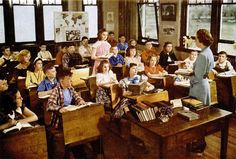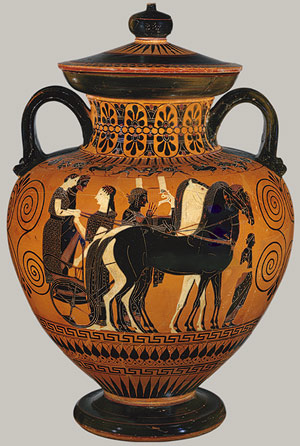Life was school and school was life for me in those days. Everything revolved around school.
Every morning, except on Sundays school started exactly at 8:00 a:m. and the big portal with the stained glass motto “Not for School but for Life” was locked by the caretaker. If you were late you had to ring a bell. The custodian would open for you and ceremoniously accompany you to the principal’s office at the top floor of the school. Frau Lindemann reigned like a queen at her huge shiny mahogany desk. She was a short, round lady with snow white hair, bright blue eyes and very red cheeks. She looked kind, but that was deceiving. She was a tough disciplinarian. The first time you were late she would give you a severe reprimand. If you were late three times you would be suspended for a week. If you had three suspensions you would be dismissed from school. We feared Frau Lindemann and would only enter her office with great trepidations.
Our classrooms looked austerely functional. There were huge blackboards on the front and side wall opposite the big windows. We would sit in neat rows of two side by side desks facing the main black board in front and the teacher’s work station. The room was bare of pictures, displays, plants or any decorative items. There was nothing to distract us.
 However, in this boring physical environment we had the most exciting experiences. We would vicariously relive mankind’s quest for scientific knowledge and spiritual truths. Most of our teachers were passionate about expanding our minds. They tried to teach us skills to foster critical thinking, problem solving and effective oral and written communication.
However, in this boring physical environment we had the most exciting experiences. We would vicariously relive mankind’s quest for scientific knowledge and spiritual truths. Most of our teachers were passionate about expanding our minds. They tried to teach us skills to foster critical thinking, problem solving and effective oral and written communication.
We read works of world literature, first in German and then in English and French and in the last three years a few excerpts in Latin. We would discuss, debate and talk about the great themes which moved and influenced man’s quest for the meaning and purpose of life.
I loved our philosophical discussions and would always actively participate. Although our teachers were in many respects very authoritarian they encouraged free thinking. We were expected and allowed to have our own ideas and opinions as long as we could back them up with strong arguments to prove their validity.
We were fortunate to have “Mecki” as our classroom teacher. He was very eloquent in expressing deep thoughts and guiding us through difficult discussions. He was a great model.
The emphasis of our school was on language arts, while science related subjects were somewhat neglected. Our physics teacher did not expect much of us. He would spent most of his lessons telling us interesting and entertaining anecdotes of his life and war experiences. Maybe he did not want to waste his efforts teaching science to girls who would never pursue a career in that field. This was still the pervasive opinion at that time. Although I was not scientifically inclined i once delivered an amazing technical drawing of a Wankel motor. That was my one and only success in science and I earned the respect of my teacher. I have to admit remorsefully that my brother had helped me with it.
Our chemistry teacher liked spirits. She would tell us more about beer brewing techniques and wine and liqueur making than chemical formulas.
Biology was another neglected subject. Our squeamish elderly teacher was supposed to provide sex education. She would show us a film of a pregnant mare who miraculously all of a sudden had a newborn foal beside her. The actual birthing scenes were left out. We were left in the dark.
Another substitute teacher took over the topic by telling us a Greek legend of a pot which eventually finds it’s matching lid. It sounded all Greek to us and we were quite bewildered . Eventually we had to search for answers in real life not at school.
we
.
.






